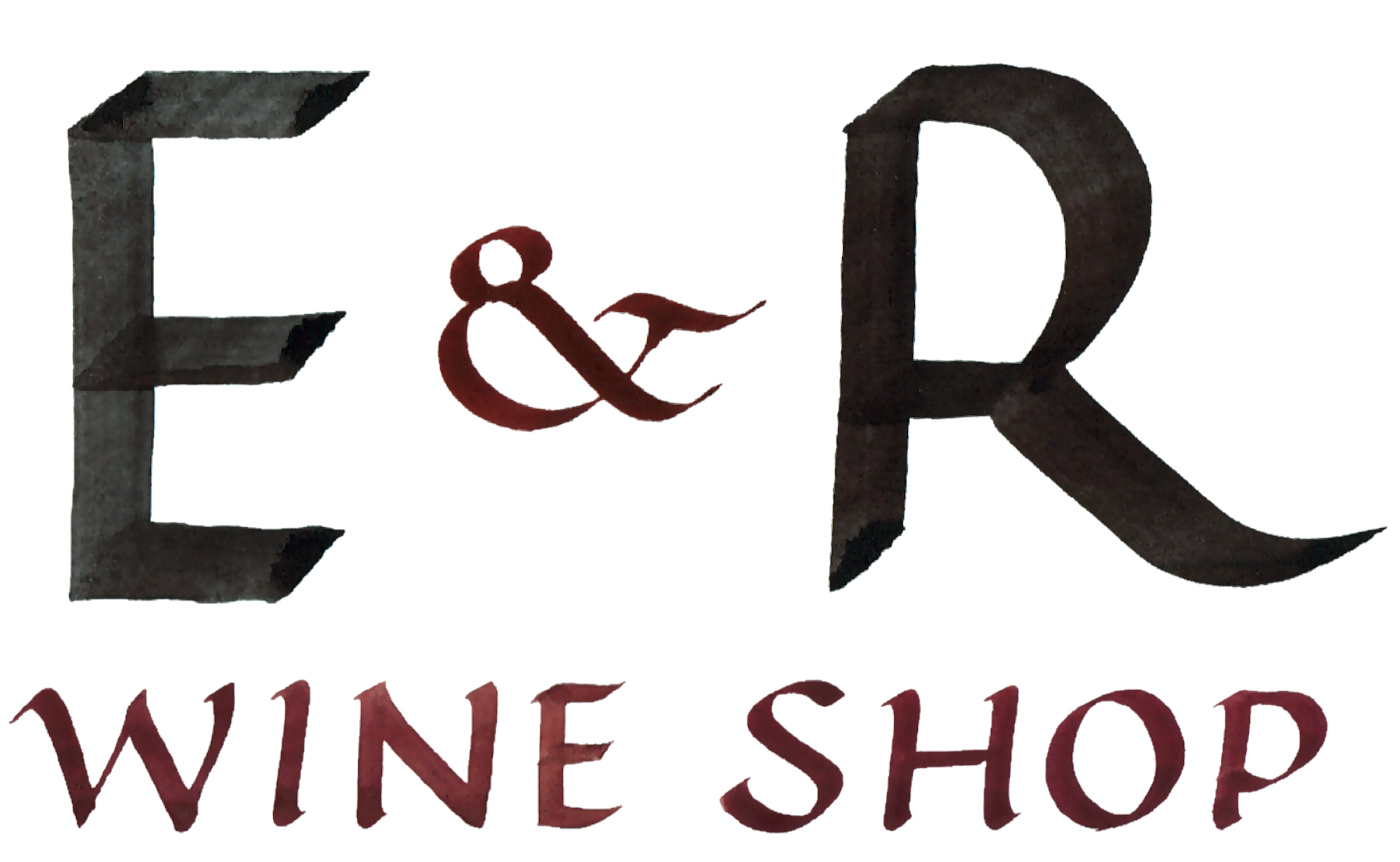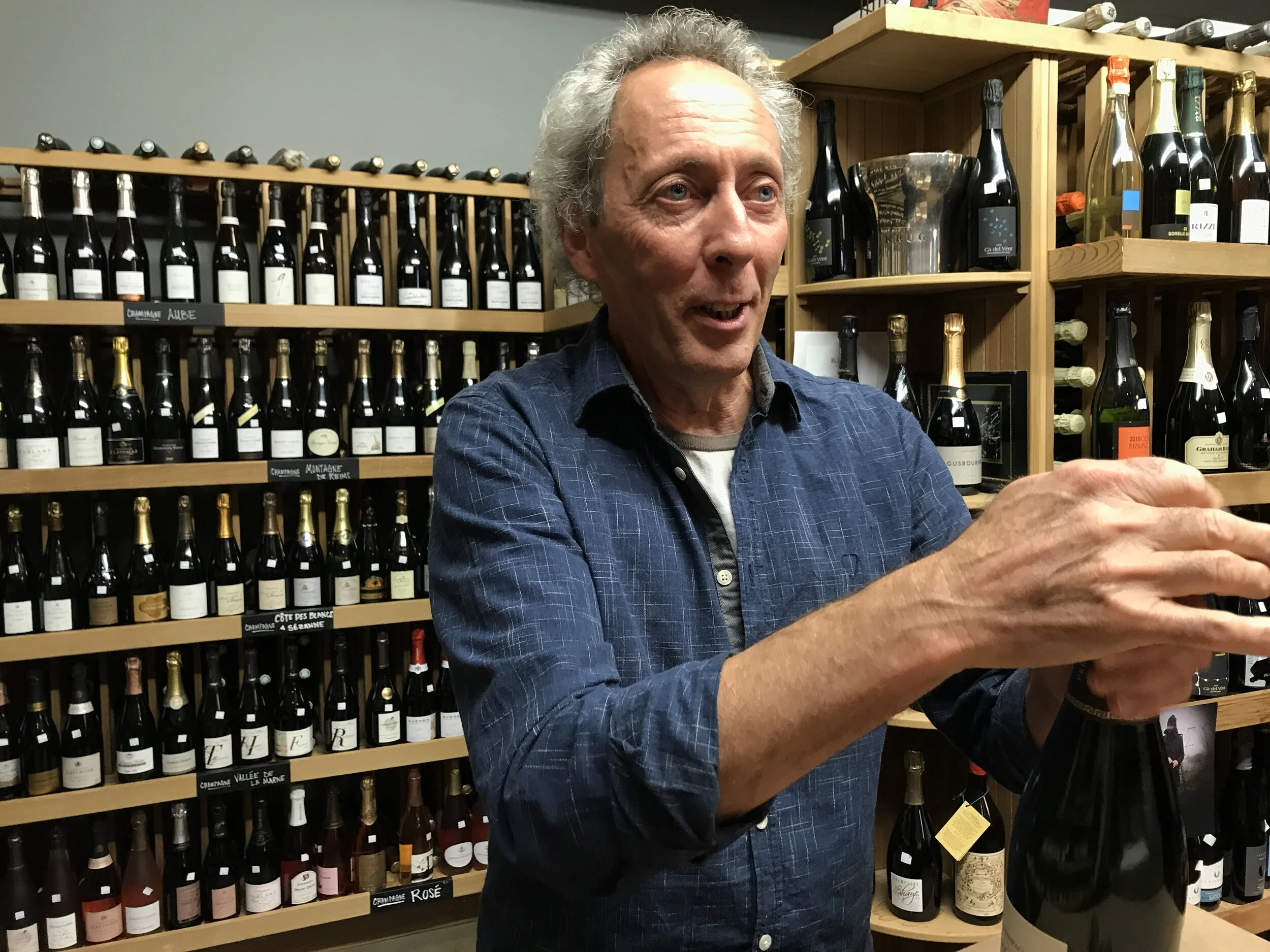Pascal Doquet - Champagne, France
Always with a finger on the pulse of his work - Pacal Doquet.
CHAMPAGNE VIGNERON : CURIOUS, CONNECTED & NEVER AT REST
We first visited Pascal Doquet in the Côte des Blancs village of Vertus a little over nine years ago. In many ways, though, it feels like our first introduction was long before the nearly sprouting vines of March 2011 were just about to peak their fragile buds into the brisk sun-filled spring air. It was love at first taste and we've invested much effort, time, travel and negotiations since then to get Doquet's spellbinding Champagnes to our little shop in Portland, Oregon. Luckily, it turned out we're as fond of Pascal as we are of his wines so the whole process has been a pure pleasure. Now, nine+ years and multiple visits to Champagne (and countless exchanged emails (and shared music files) later, we could not be more ecstatic to announce that new wines have arrived!
The full story of how we are finally able to offer Doquet's wines directly to Oregon is a long and complicated one that involves the uniquely American three-tier wine importation system. During the last decade we have watched, visited and tasted with Pascal Doquet as his wines have risen to the top of the Grower Champagne pyramid. The wholly organically farmed wines from Pascal Doquet are easily among the very best quality in Champagne and prices are remarkably fair. His visit to the shop this past Fall was the perfect demonstration of how wonderful his work is. Always great to be in the presence of M. Doquet, the current President of the “Association Champagnes Biologiques.” http://www.champagnesbiologiques.com
Pascal in the shop last Fall.
On one of our visits we aked him about his work:
E&R to Pascal Doquet: You have exceptional terroir in and around the Côte des Blancs and a curious spirit that never allows you to rest at your work. You also seem very spiritually connected to your land and your wines. This fierce combination means you are continually experimenting and progressing. What is the most important step you have taken with your work since taking the reigns at your family domaine in 1995? What is the most meaningful part of your job to you personally?
Doquet's reply to E&R: Like all important things, the answer depends on which view point is used as reference. I could talk from a technical point of view: working the soil (tilling and ploughing) and the natural grass-cover are, I believe, the part of my work which has had the most influence on the style of my wines. The grass growing in my vineyards is both a gauge for the life in the soil but also a “doctor” helping each terroir to reach their own balance. My upkeep work aims at finding a perfect balance between flora, fauna and vine growth. I plow to bring living food into the soil via this natural fertilizer renewed every season. I think it brings complex materials to the roots of my vines which will enhance the complexity of my Champagnes.
Thinking deeper, I could start talking from a spiritual point of view. In this case, the most important thing in my job is to have kept the ideals from my youth; it is to have, till today, always been looking for ways to work in tune with my ecological and humanist beliefs which have been with me since I became consciously aware. Consequently, it is also having said “No!” No to what industries offered to the winegrowers from my father’s generation, giving them means to make a better living, while making the job less painful.
Organic agriculture is not easy, especially in Champagne where the weather is often wet when the vines are susceptible. Choosing that road requires a strong will to resist the pressure of main-stream thinking that exists in any group or trade. However it is also often gratifying. My vineyards are like islands of bio-diversity. Each of my visits in my vineyard brings me reasons to rejoice: A new flower starting to grow, the buzzing of the bees, the peeps of the birds which fly away as I get closer or a startled jackrabbit which runs away.
I like that our pickers come back every year and enjoy the exhausting labor of harvest. I like leading them and sharing with them; as we taste the wine already born in the living grape. I like making my wine thinking about the people who will share it, here or far away, between friends or family.
What is important are the intentions I put in my every day acts and decisions. From my family, from my parents I inherited the blessing to be one day my own boss. I cherish this freedom of being independent and every day I appreciate my luck. I hope that this state of mind and my respect for life in general shows in my Champagnes; so they can become means of connections and sharing for those who will taste them.
As can be gleaned from the quotation above, Pascal Doquet is a seeker and an explorer; he is also an extremely talented winemaker/grower, a kind soul and an all-around wonderful person. A vigneron since 1982 and in charge of his family's domaine, Doquet Jeanmarie, from 1995 to 2003, Pascal has continued to grow with and through his work to this very day. Upon his parents' retirement in 2004, the family property was divided between him and his siblings and Pascal was able to establish his own domaine with the vineyards he inherited. As a person clearly connected to his land and to all living things, his tendency was always toward sustainable agriculture but he was able to deepen his commitment once on his own. In 2007 he began the process of obtaining organic certification, and in 2010 his domaine was officially certified.
There is a difference between talking the organic talk and actually walking the walk, especially in a cool, wet, often humid climate like Champagne. It is a risk and, as Doquet stated (above), it requires a strong will and unwavering commitment. The first time I visited Pascal he took me to his vineyards and I could plainly see the difference between his organically farmed vineyards and the neighboring vines which had clearly been treated with a different philosophy in mind (see photos above). Beyond the overt visual evidence of the extreme care with which he worked, I could also see the connection he had to his land. He handled the dirt and pointed out beneficial "weeds" and insects serving as "teachers" that would allow him to recognize health or illness in the vineyard. His face glowed as he spoke about his vineyard: the natural grass he allowed to grow between the rows, low impact tractors, homemade compost and an overall balanced ecosystem. I was admittedly impressed because he had demonstrated the kind of work in the vineyard that we always hope for and which is the strongest avenue for successful wines.
After our important and educational field trip to the vineyards, we arrived back at Pascal's office/home to taste the wines. One way to sum it up is to mention that it was light outside when we started tasting... and it was after 10pm by the time I even thought to check my watch (mind you, it was March, not the long days of summer when dusk settles in around 9PM). Kid in a candy store would be an apt way to describe this tasting. Pascal pulled out wine after wine and each one was an illuminating experience unto itself. His work in the vineyards was strikingly apparent in the wines; they were all so transparent, shimmering with minerality and exquisitely expressive of their individual vineyard areas. It was clear that Pascal was as thoughtful with his work in the cellar and handling of the wines as he was in the vineyard. From the vineyard to the cellar: he is careful to harvest the grapes when they are ripe (contrary to the flavor profile of many popular name brand Champagnes, grapes destined to be made into Champagne do not need to taste like flavorless acid water); yields are consistent and lower than the standard set by the governing body of the AOC of Champagne; he uses only the first two pressings, sometimes referred to as the "heart" of the juice and recognized for elegance and purity; fermentations are carried out with indigenous yeasts in enameled lined steel tanks (as opposed to stainless steel which he believes are prone to developing off flavors/aromas); and wines are stored in an underground cellar carved into the chalk of the earth. (Orignal parts of article by former long term team member Stephanie Sprinkle.)
Who said tasting were easy??
Click on each wine for more detail.








